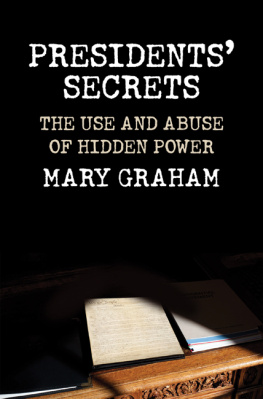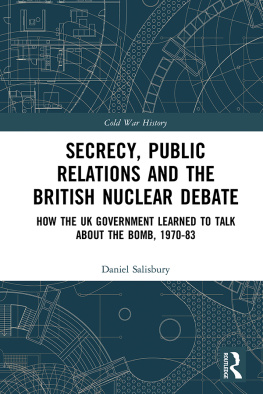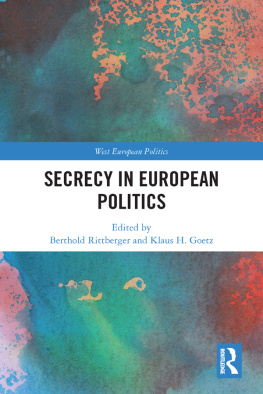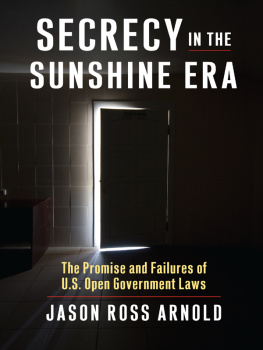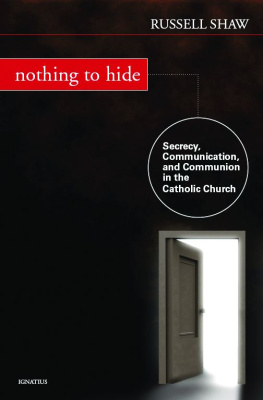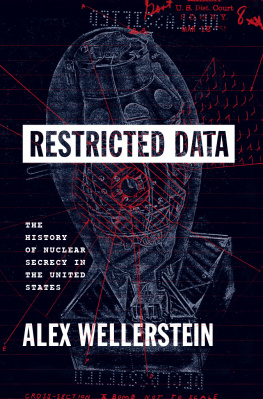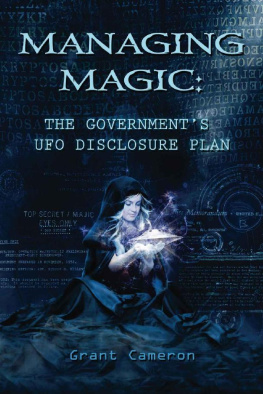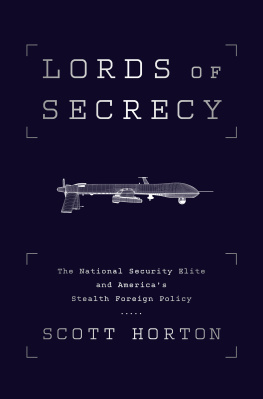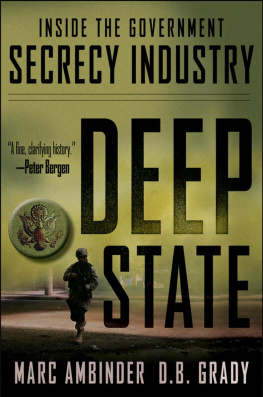PRESIDENTS SECRETS

Published with assistance from the foundation established in memory of
Calvin Chapin of the class of 1788, Yale College.
Copyright 2017 by Mary Graham. All rights reserved.
This book may not be reproduced, in whole or in part, including illustrations,
in any form (beyond that copying permitted by Sections 107 and 108 of the
U.S. Copyright Law and except by reviewers for the public press),
without written permission from the publishers.
Yale University Press books may be purchased in quantity for educational,
business, or promotional use. For information, please e-mail
(U.S. office) or (U.K. office).
Set in Time Roman type by IDS Infotech Ltd., Chandigarh, India.
Printed in the United States of America.
ISBN 978-0-300-22374-3
Library of Congress Control Number 2016950309
A catalogue record for this book is available from the British Library.
This paper meets the requirements of ANSI/NISO Z39.48-1992
(Permanence of Paper).
10 9 8 7 6 5 4 3 2 1
CONTENTS
ACKNOWLEDGMENTS
MANY PEOPLE HAVE HELPED MAKE THIS BOOK possible. I owe a special debt of gratitude to Senator Daniel Patrick Moynihan, who provided the inspiration for much of my work over the past twenty years. When I began to write about the politics of public information in the late 1990s, Senator Moynihan introduced me to eminent scholars and led impromptu seminars for me and my research assistants. The report of the Commission on Protecting and Reducing Government Secrecy, which he chaired, and his 1998 book Secrecy informed our work at Harvards Kennedy School of Government and provided a starting point for this book. Beginning in my college days, he and his wife Liz provided wise counsel, intellectual challenge, good humor, and hospitality as they did for so many students. I am grateful for Lizs continuing friendship.
I am grateful to another early teacher, Edward C. Banfield, professor of government at Harvard, with whom I studied and for whom I worked most college summers. Ed never gave up trying to teach his students to think skeptically and write clearly, despite our shortcomings.
I would not have had the temerity to begin this book or to complete it if it had not been for the encouragement and advice of presidential historian Michael Beschloss. His encyclopedic knowledge of presidents lives and deeds is unparalleled, as is his patience.
Jim and Kate Lehrer read the full manuscript at an early stage, gave me detailed comments, helped answer countless questions, and remained optimistic that I would someday finish this project. When I thought I had completed the manuscript, Bob Samuelson, who has been one of my best critics since our days as college journalists, suggested that I take more time to revise it. I learned a great deal from that extra year, and I hope the revisions have resulted in a clearer, more cohesive story.
Corby Kummer, senior editor of the Atlantic and editor-in-chief of Ideas: The Magazine of the Aspen Institute, edited multiple versions of the manuscript with his usual high standards, good humor, and exceptional tolerance of an authors foibles. I have learned more about writing from Corby than from anyone else. When I was tempted to give up an endeavor that was more difficult than I expected, it was Corby who said you cant.
At Yale University Press I am grateful to executive editor Bill Frucht, consulting editor Steve Wasserman, and manuscript editor Phillip King. My agents, Katherine Flynn and Ike Williams, shepherded the book through the publishing process. Michael Rudell and Eric Brown provided exceptional support and legal advice.
I am grateful to the historians, journalists, and scholars who took the time to read and comment on some or all of the manuscript. They include Jill Abramson, Michael Beschloss, John Milton Cooper, Jr., Chris DeMuth, Jack Fuller, Archon Fung, Alonzo Hamby, Bo Jones, Marjorie Scardino, Geoffrey Stone, and David Weil. Michael Schudson, who reviewed the manuscript for Yale University Press, offered many insights that helped to improve the final product.
Family and friends who provided helpful comments included Will Graham, Molly Graham, Don Graham, Liz Moynihan, and Laura and Tim OShaughnessy. I am grateful to John Auerbach, Afsaneh Beschloss, Sara Lawrence-Lightfoot, Walter Pincus, and Bob Woodward for their interest and support.
I have had the great pleasure of working with two exceptional researchers. We aimed to rely on primary sources and original documents whenever possible, supplemented by the accounts of participants, and by the interpretations of leading historians. Hilary McClellen worked with me on the Cold War chapters and on the particularly difficult task of understanding and documenting the emergence of twenty-first-century secrecy and openness. Her precision, good judgment, and unfailing can-do spirit made this a much better book. Terri Saint-Amour, then a reference librarian at Harvard Law School, constructed a remarkable database of original documents tracing the founders views of secrecy and openness and those of the nations first president, including debates, correspondence, and contemporary newspapers. She also helped me reconstruct from primary sources the complexities of Woodrow Wilsons presidency and his illness.
I am grateful to the many archivists at presidential libraries who helped answer research questions. They include Claudia Anderson, Sarah Cunningham, and Jennifer Cuddeback at the Lyndon Baines Johnson Presidential Library; Randy Sowell at the Harry S. Truman Library; Jeremy Schmidt and Elizabeth Druga at the Gerald R. Ford Presidential Library; Jon Fletcher at the Richard Nixon Presidential Library; Ira Pemstein at the Ronald Reagan Presidential Library; Keith Shuler at the Jimmy Carter Presidential Library; Jason Kaplan at the William J. Clinton Presidential Library; and Brandon Zogg at the George W. Bush Presidential Library.
Others who assisted with research questions included Betty Koed, associate historian, United States Senate; Brian McLaughlin at the Senate library; Bruce Bustard and Abigail Myrick at the National Archives and Records Admin-istration; Julie Thomas, a librarian at California State University, Sacramento; Amy Fitch, an archivist at the Rockefeller Archive Center; and Rachel Scheer, a publicist at Scientific American.
I was also assisted by scholars David M. Barrett, John Feerick, Jeffrey A. Engel, Beverly Gage, Joel K. Goldstein, Thomas J. Knock, Michael R. Lemov, Christopher E. Manning, and Garrison Nelson.
Cambridge colleagues Archon Fung and David Weil have provided fifteen years of learning and collaboration at the Transparency Policy Project as we have tried to understand the politics of public information, and their friendship has enriched my life. It has been a great pleasure to work with Elena Fagotto, who not only directed research at the project but also handled daily demands and supervised research assistants while I was writing.
I am grateful to friends and neighbors Royal Kennedy Rodgers, Jessica Roth, and the Bosco family in Washington, D.C., and to Edna and Peter Collom, Susan and Chip Morse, Karen and Tom Tierney, Judy and Phil Richardson, Katie Westfall Tharp and Eugene Mirman, Ann Dvorak Warner, and Annalisa Eisen in Woods Hole, Massachusetts.
I learned a great deal from accounts by participants in the administrations of the presidents I have focused on. The participants are too numerous to name but their books and articles were extremely valuable in providing diverse perspectives and lively detail. I especially want to acknowledge the accounts of members of the intelligence community who have taken the time to explain the importance of protecting essential secrets in an open government.
Next page
